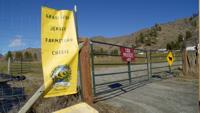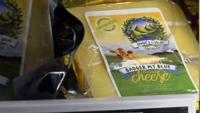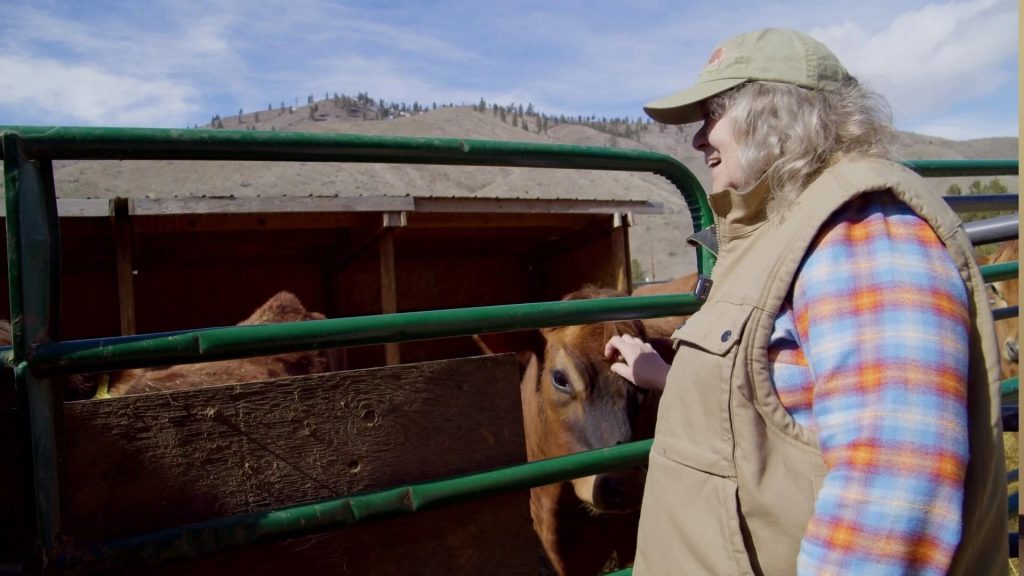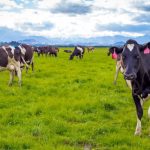
“This is Dolly,” Laurie Neal says, introducing one of the 11 Jersey cows who live on her Knapps Hill Coulee dairy farm. “And that’s Jolene — if you’re picking up any kind of theme.”
Laurie’s cows are all country stars, in their way. They’re the engine behind Laurel’s Crown Farmstead Cheese, produced on Laurie’s nine pastured acres just above Lake Chelan.


“I started with making hard cheeses,” she recalls. “So we have one called ‘Jersey Girl.’ I do ‘Badger Mountain Blue’ — more in the summertime; blue’s a little funky to work with.”
Laurie and her husband, Wenatchee architect Mark Neal, acquired their acreage in 2018, and Laurie bought her first cows in 2020. As far as she can tell, her farm is the only commercial cheese dairy in Chelan County. She’s made some specialty cheeses in partnership with Lake Chelan breweries and wineries. Last year, she ventured into feta. “It kind of just depends on what mood I’m in,” she says.
With aging equipment and a little seasonal help, Laurel’s farm can produce and package about 200 pounds of cheese a week. It’s sold at local produce stands as well as natural food stores, like Sage Mountain Natural Foods in Leavenworth.
“One of the advantages to Jersey milk is that it’s very rich,” Laurie says. “And so I actually get more than more cheese per gallon than I would get, say, if I had Holstein milk.”
Seeking to boost that output, Laurie began looking into federal grant sources. For 10 years before her cheesemaking career, she worked as an educator in the Wenatchee School District under the federally-funded Gaining Early Awareness and Readiness for Undergraduate Programs, or GEAR UP — so she was no stranger to the workings of government grants. Some of the first equipment she bought for Laurel’s Crown was also paid for by federal reimbursement, such as a USDA Rural Development Grant to buy a 75-gallon vat.


“We’re currently using a 60-year-old pasteurizer,” she says. “And it’s been a workhorse, there’s no doubt about that. But we wanted to improve that situation. We’re limited, on our smaller equipment, with how many wheels we could press and have them come out looking really good.”
Last year, Laurel’s Crown and other West Coast dairy farms were selected to share in $690,000 worth of grant funding through the Dairy Business Innovation Initiative, a federal reimbursement program managed by the U.S. Department of Agriculture. The initiative helps small dairies modernize and improve their outputs, reimbursing them for approved equipment purchases. The clearinghouse for the grant is the nonprofit Pacific Coast Coalition-Dairy Business Innovation Initiative, which serves as a channel to the U.S. government for dairy operators in six Western states.
On Dec. 2, Laurie was given the go-ahead to make purchases under the grant. She spent thousands of dollars — she declines to give an exact figure — to acquire a new milk vats, lines and processing equipment. The new gear, in combination a new shed being built for milk processing, pasteurizing and aging, would put Laurel’s Crown in a position to add more workers and essentially double its production. (The construction is not covered by any grant.)
President Donald Trump took office Jan. 20. He began issuing a slew of executive orders to federal agencies, including USDA, canceling or freezing trillions of dollars in promised funding. American farmers and projects they’d launched under promised grants were not spared.
“Towards the end of January, there was kind of some rumblings,” Laurie says today, “and we were getting ready to purchase the pasteurizer, and we wanted to get in before any increases in the cost of stainless steel and that kind of thing.
“But we asked the question, should we be concerned here? And we were told that the USDA basically was saying, no, things are going ahead as planned. So we went ahead and purchased the pasteurizer. And then we started getting messages from our facilitators that said that USDA was not communicating with them on their questions.
“And then finally, on Feb. 28, they said all of the funds have been frozen, there will be no reimbursements right now, and we have no idea when that’s going to change.”
White House officials, including Agriculture Secretary Brooke Rollins, said they were seeking to ensure federal grants were not oriented toward diversity, equity and inclusion goals, or toward “far left climate programs.” That left Laurel’s Crown with out-of-pocket expenses, which were guaranteed to be covered under the grant, that couldn’t be repaid.
Laurie spent the following week working the phone, calling state and federal lawmakers and reaching out to local media who might spotlight her situation. Finally, after five days of uncertainty, the USDA completed its review of DBII grants and released the funding.
“You know, we’re in a much better position than people that other people that we’ve talked with,” Laurie says. “There were people that had money that they had taken out of their day-to-day operations, and then found that it was not going to be reimbursed. And that was a significant hit for those folks.”
Grants like the DBII are crucial for small farmers, she says, and when government handling of grants creates uncertainty, it has ripple effects.
“These types of grants offer us the opportunity to innovate and expand,” she says, “where otherwise we might not have the opportunity — because we just can’t get far enough ahead to do that.”
You can now read the most important #news on #eDairyNews #Whatsapp channels!!!
🇺🇸 eDairy News INGLÊS: https://whatsapp.com/channel/0029VaKsjzGDTkJyIN6hcP1K























